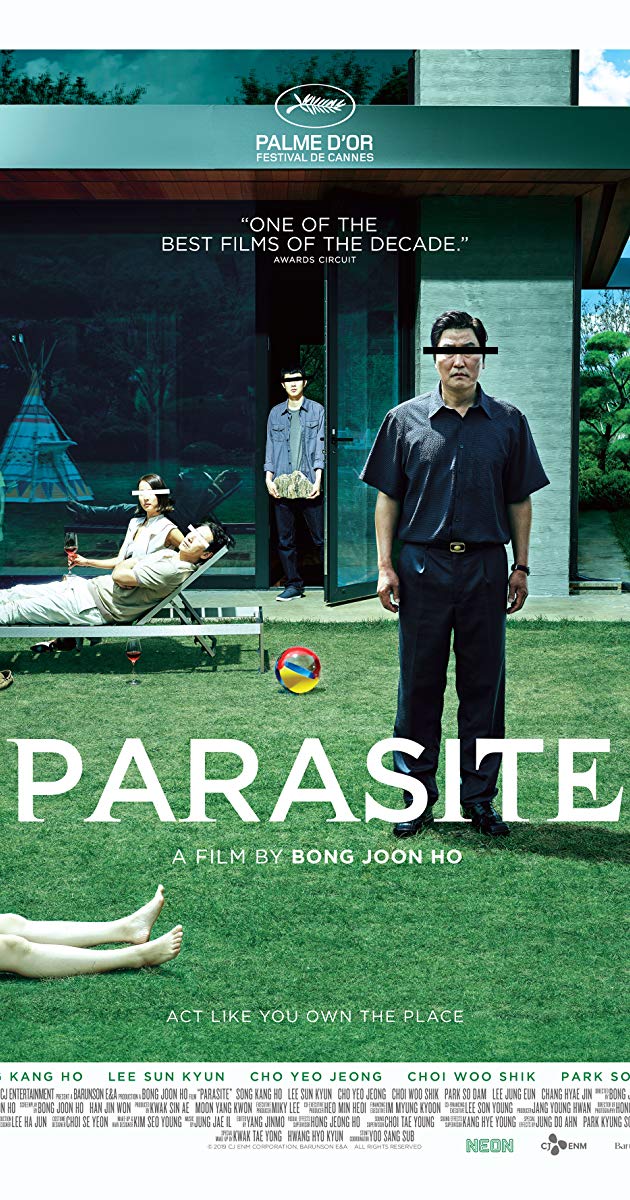
c/o imdb.com
As the annual film award season nears its conclusion, the film industry and its appreciators hold their breath in anticipation for the hotly contested Academy Award for Best Picture. Although familiar and returning faces such as Quentin Tarantino, Martin Scorsese, Leonardo Dicaprio, Sam Mendes, and Robert DeNiro are among the contributing directors and actors for the nominated films, one unfamiliar group of names stands out among the rest: Bong Joon Ho, Kwak Sin Ae, and Song Kang Ho, the creators of the 2019 South Korean thriller “Parasite.”
From enjoying unexpected commercial success at the international box office to quickly becoming an internet cult-favorite, it’s no secret that “Parasite” was one of the hottest movies of 2019, and still continues to be in 2020 (it’s screening in Metro Movies right now, if anyone is wondering). And it’s for a good reason. Jam-packed with a thrilling 132 minute runtime, “Parasite” redefines what it means to be genre-bending. In what can be best described as a thriller, comedy, horror, or simply a masterpiece, director Bong Joon Ho displays his unparalleled knack for satirical social commentary by delving deep into the heart of modern capitalism and social inequality.
“Parasite” has also found critical acclaim among the film industry, as it took home the prestigious Palme D’or at the 2019 Cannes Film Festival and has received awards from major categories at other film festivals, such as the BAFTAs and the Golden Globes. It has also become the first South Korean film to be nominated for the Academy Award for Best Picture.
However major the success of “Parasite”, the trend of recognition of international films didn’t begin with the movie. One can look no further than the nominees for last year’s Best Picture to find “Roma”, a foreign language film entirely in Spanish. Directed by the mercurial Alfonso Cuarón, “Roma” is an epic drama that details a semi-autobiographical story of Cuarón’s upbringing in Mexico City. Although “Roma” unfortunately lost out to Peter Farrelly’s “Green Book” and was unable to take home the grand prize of the evening, it’s nomination still signaled a welcome shift in the Oscars.
It’s monumental for films such as “Parasite” and “Roma” to be recognized on the largest stage, instead of being shoehorned into the category of Best International Feature Film. They are finally being appreciated among their American contemporaries. Although it’s too early to jump to conclusions, the consecutive nominations of “Roma” and “Parasite” can perhaps be seen as the beginning of a trend towards a more diverse international audience, instead of the customary Western-dominated scene.
However, even in the midst of all the milestones and celebrations, the disturbing lack of acting nominations for the actors in “Parasite” such as Song Kang Ho, Lee Jeong-eun, and Park So Dam still shows that the film industry has a long way to go when it comes to accepting and recognizing international and non-white actors.
Perhaps Bong Joon Ho said it best during his acceptance speech for winning the Best Motion Picture in a Foreign Language at the Golden Globes this past month.
“Once you overcome the one inch tall barrier of subtitles, you will be introduced to so many more amazing films,” he said.
This message of emphasizing the universality of film is ever-important in an age where the Oscars are under constant fire for their lack of diversity among their nominees and their Academy members, whether it is the lack of female representation among nominated directors or the issue of #Oscarssowhite. It is important to remember that when it comes to the language of cinema, there should be no barriers, whether it comes to language, culture, race, or gender; but rather, it is a universal art form meant for all, and to be enjoyed by all.
Will Lee can be reached at swlee@wesleyan.edu.